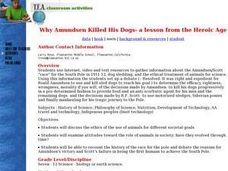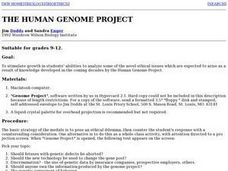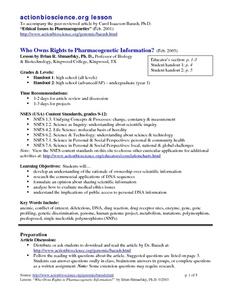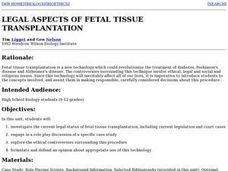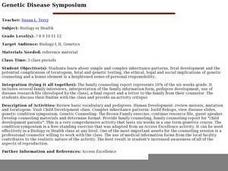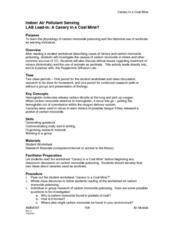Curated OER
Why Amundsen Killed His Dogs
Students use Internet, video and text resources to gather information about the Amundsen/Scott race for the South Pole in 1911-12, dog sledding, and the ethical treatment of animals for science. They set up a debate to determine the...
Curated OER
Bioethics of Stem Cells
Young scholars complete a variety of activities as they examine the ethics behind stem cell research and use.
Curated OER
Bioethics And Fetal Tissue Research
Students are introduced to the topic of fetal tissue implantation. In groups, they examine a case study and share information with the rest of the class. Then they do a reflective writing assignment to assess understanding of the ethical...
Curated OER
The Human Geonome Project
Young scholars explore the Human Genome Project (HGP). Students research a fact situation, examine genetic data given, and discuss choices available for a solution. Young scholars consider the ethical question and consequences of each...
Curated OER
Can You Detect Bias?
Eleventh graders recognize some, but not all ethical processes (e.g., independent verification, clarifying assumptions, disclosing conflicts of interest) that shape scientific endeavors. Students build awareness of how various sources...
Curated OER
Race and Genetics: An Integrated Approach
Students analyze racial issues related to the Human Genome Project. They participate in a mock symposium and write a reflection/position paper based on specific ethical principals.
Curated OER
Gene Therapy - Biotechnology
Pupils complete a unit of study on bioethics. They participate in a discussion about gene therapy and its uses. They review two case studies and discuss the ethical issues focused on in the cases. They develop a patient record based on...
Curated OER
Stimulus Response
Students explore the five steps in the stimulus-response pathway. They analyze the senses and the difference between animals' primary and secondary senses. Students collect information about animal behavior to debate the ethics of...
Curated OER
Who Owns Rights to Pharmacogenetic Information?
Students develop an understanding of the rationale of ownership over scientific information. They research commercial applications of DNA sequences. They analyze how to evaluate medical ethics issues.
Curated OER
DNA Fingerprinting: You Be the Judge!
Students use their knowledge of DNA fingerprinting to evaluate the use fingerprints in courts, and will address the ethics of establishing a national database of fingerprints.
Curated OER
DNA Fingerprinting: You Be the Judge!
Students explore DNA fingerprinting. Students discover how DNA fingerprinting is done and judge the validity. They evaluate the use of certain prints in courts and address the ethics of establishing a national database of fingerprpints.
Curated OER
Energy Conservation
Students complete a variety of activities as they examine forms of energy, use of energy, different technologies to harness energy and the ethical implications of these sources and technologies.
Curated OER
Genetic Engineering
Students discuss the risks and benefits associated with biotechnology. In this biotechnology lesson, students discuss the role of genes in the body and brainstorm ethical issues relating to biotechnology. They read about an ethical issue...
Curated OER
Transgenic Mammals
Students are provided with a real life example of research in the areas of genetic and molecular biology. Students examine ethical considerations and related issues such as patent laws and regulatory procedures.
Curated OER
Learn to Build a Rocket in 5 Days or Your Money Back
Students discover the entire process that goes into designing a rocket for any customer. They study important factors such as supplies, ethics, deadlines and budgets. Also, students explore about the Engineering process, and recognize...
Curated OER
Legal Aspects Of Fetal Tissue Transportation
Students investigate the current legal status of fetal tissue transplantation. Students engage in a role play discussion of a specific case study. Students explore the ethical controversies surrounding this procedure. Students formulate...
Curated OER
Genetic Disease Symposium
Students research simple and complex inheritance patterns, fetal development and the potential complications of teratogens, fetal and genetic testing, and the ethical, legal, and social implications of genetic counseling.
Curated OER
Indoor Air Pollutant Sensing LAB Lead-In: A Canary in a Coal Mine?
Students investigate the causes of carbon monoxide in mines and other common sources of CO. Pupils read the worksheet "Canary in a Coal Mine" before beginning this investigation. They discuss ethical issues regarding treatment of miners...
Curated OER
The Talk Show: A Bioethical Dilemma About Neurological Disorders
Learners explore neurological societal problems. They research, collect information and assess the ramifications of ethical, economic, political, and social issues. During a talk show simulation, students present their decisions.
Curated OER
Beyond Organic?
Students examine the critiques of organic agriculture and its production and marketing approaches. In this sustainable agriculture lesson students study how the ideas about ethics of the food system are changing.
Curated OER
Biotechnology
In this biology worksheet, students complete a crossword puzzle with 23 questions on biotechnology. They identify the benefits and ethical issues about biotechnology.
Curated OER
Introduction to Toxicology
Students explore the science of toxicology and the relationship between a toxic reaction (response) and amount of substance (dose). They observe two demonstrations illustrating the concept of dose-response.
Curated OER
Debates in Human Genetics
Students examine case studies involving human genetics. They research the case and determine possible problems to the issue. Students write essays supporting their opinion. They debate the ethical issues.
Curated OER
Floating Soap
Students explore the density of soap. In this science lesson, students conduct an experiment to find which types of soap will float. Students make a hypothesis and record their observations.


